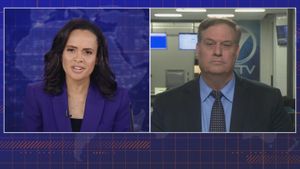Computer-assisted wagering (CAW) has become increasingly prevalent within the horse racing industry, sparking debates over its impact on the sport and everyday bettors. Essentially, CAW utilizes sophisticated algorithms and software to analyze extensive data sets on horses, jockeys, and races to make highly calculated bets. This high-tech approach to gambling has greatly altered the betting dynamics, often leaving traditional bettors at a significant disadvantage.
Tracks are increasingly selling their racing pools to these tech-savvy whales, who bet huge amounts at more favorable odds. Some industry insiders liken this to insider trading, with large syndicates reaping profits at the expense of regular gamblers. According to experts, the betting pools funded by average punters are now being exploited as these large players take advantage of special agreements and rebates from racetrack owners, often significantly tilting the playing field.
Elizabeth Banicki, who has deep ties to the industry, shared memories of her time working with racehorses like Dodgen Bullets, who was nurtured under acclaimed trainer Bob Baffert. This nostalgic reflection emphasizes how the sport of horse racing, once vibrant and community-driven, is now perceived as being at the mercy of wealthy gamblers. Banicki revealed how her experiences on the Del Mar racetrack back when she saw Dodgen win his inaugural race now feel intertwined with the current controversies over wagering systems.
Scott Daruty, president of Stronach Group's gambling entities, claims there’s no conflict of interest when his organization engages with these sophisticated betting teams. He firmly believes their close ties yield valuable insights and relationships with the biggest customers. “It’s the right thing, in my opinion,” Daruty explained to California Horse Racing Board commissioners. Despite such statements, the nature of CAW raises ethical questions about fairness within the betting framework.
According to Pat Cummings, from the National Thoroughbred Alliance, these advanced systems can predict fluctuations in odds and identify patterns often overlooked by casual bettors. While traditional betting has been on the decline, with non-CAW wagering down by two-thirds over the last two decades, these high-frequency bettors now account for nearly one-third of total bets placed on U.S. thoroughbred racing. This stark transformation highlights the growing gap between casual bettors, like grandparents or college students, and high-caliber players who place impactful bets merely seconds before the start of each race.
Many amateur bettors express concerns over the perceived advantages enjoyed by CAW players, suspecting they may even have access to internal pool information, thereby facilitating their ability to place more informed bets. This ambiguity exacerbates the debate around CAW practices, leaving room for calls to investigate potential gaming law violations. Cummings' analysis suggests only about 10 to 12 top-tier players are operating within this framework, affecting the estimated $2-$3 billion wagered last year.
Even as these betting approaches dominate the industry, it becomes increasingly tough to gauge what horse racing would look like if CAW were completely removed. With the gradual decline of racetracks across America, many speculate tracks would face dire economic consequences without their lucrative partnerships with high-tech betting firms. Markets have shifted dramatically; Santa Anita Park, widely regarded as host to some of the sport's most electrifying events, is now—according to insiders—struggling to maintain its relevance amid these changes.
While horses like Dodgen Bullets trod their way to careers fueled by human passion, the stark realities of the present-day racing industry paint it as potentially parasitic, feeding on the backs of everyday bettors who have played such pivotal roles traditionally. The horse racing environment is fraught with challenges where everyday bettors are increasingly sidelined, raising serious concerns about the sustainability of the sport itself.
Looking toward the future of horse racing, the prevailing prediction points toward boutique tracks surviving by hosting exclusive events rather than cultivating widespread interest. Meanwhile, certain areas will keep races alive, albeit under questionable conditions. With the sport still seeing contraction—like diminished foal crops and fewer race days—the question of whether it can reclaim its former glory hangs heavily without substantial reforms.
The narrative surrounding Dodgen Bullets and similar horses exemplifies how regular racehorses sustain interest amid shrinking communities entrenched within the prevailing economic strife. To many, the impact and ethical ramifications of CAW will reflect more than mere numbers on screens. It elevates the discussion on integrity within horse racing itself, as industry players weigh their future against the backdrop of inevitable change.



